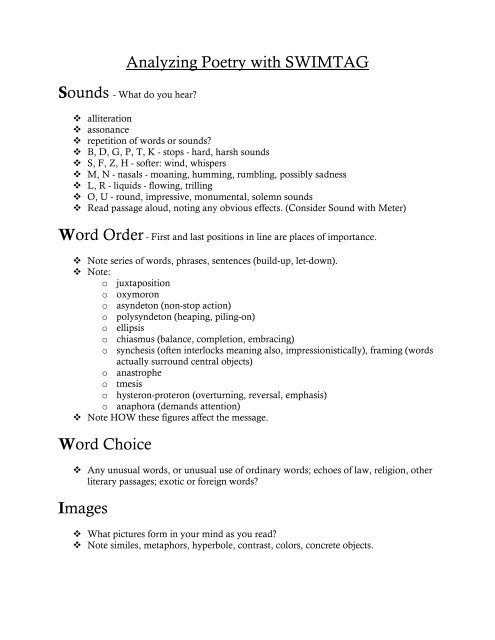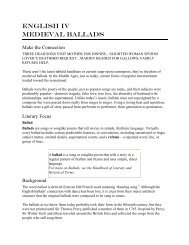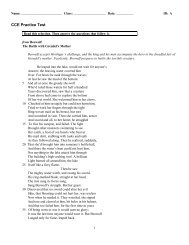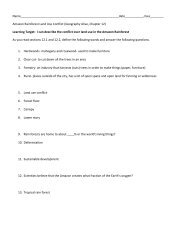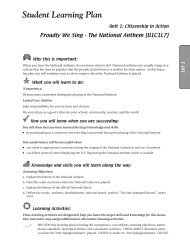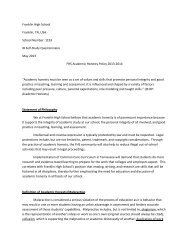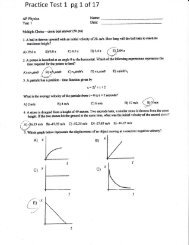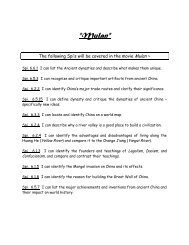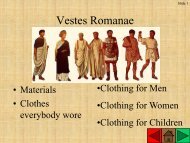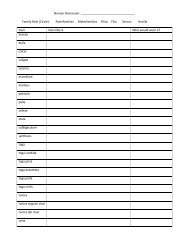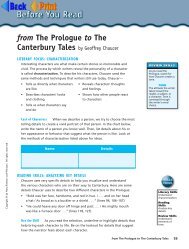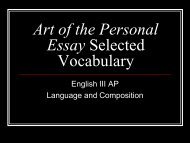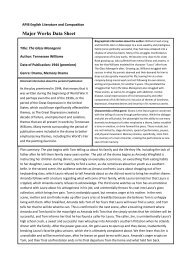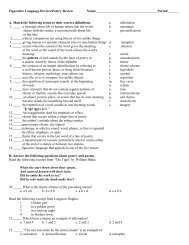Analyzing Poetry With SWIMTAG
Analyzing Poetry With SWIMTAG
Analyzing Poetry With SWIMTAG
You also want an ePaper? Increase the reach of your titles
YUMPU automatically turns print PDFs into web optimized ePapers that Google loves.
<strong>Analyzing</strong> <strong>Poetry</strong> with <strong>SWIMTAG</strong><br />
Sounds - What do you hear?<br />
alliteration<br />
assonance<br />
repetition of words or sounds?<br />
B, D, G, P, T, K - stops - hard, harsh sounds<br />
S, F, Z, H - softer: wind, whispers<br />
M, N - nasals - moaning, humming, rumbling, possibly sadness<br />
L, R - liquids - flowing, trilling<br />
O, U - round, impressive, monumental, solemn sounds<br />
Read passage aloud, noting any obvious effects. (Consider Sound with Meter)<br />
Word Order - First and last positions in line are places of importance.<br />
Note series of words, phrases, sentences (build-up, let-down).<br />
Note:<br />
o juxtaposition<br />
o oxymoron<br />
o asyndeton (non-stop action)<br />
o polysyndeton (heaping, piling-on)<br />
o ellipsis<br />
o chiasmus (balance, completion, embracing)<br />
o synchesis (often interlocks meaning also, impressionistically), framing (words<br />
actually surround central objects)<br />
o anastrophe<br />
o tmesis<br />
o hysteron-proteron (overturning, reversal, emphasis)<br />
o anaphora (demands attention)<br />
Note HOW these figures affect the message.<br />
Word Choice<br />
Any unusual words, or unusual use of ordinary words; echoes of law, religion, other<br />
literary passages; exotic or foreign words?<br />
Images<br />
What pictures form in your mind as you read?<br />
Note similes, metaphors, hyperbole, contrast, colors, concrete objects.
Meter - Scan by reading aloud<br />
Note preponderance of dactyls or spondees in any lines.<br />
dactyls - faster, lighter, lilting; spondees - slower, heavier, grander.<br />
Several elisions together - halting, emotional, fearful. Rhythm often reflects pace or<br />
mood of narrative.<br />
Mood<br />
What feelings come through?<br />
Look at adjectives and verbs. Is it formal, tragic, frightening, joyous, foreboding?<br />
Tone<br />
Can you sense or infer the author's attitude about the characters or the action (from<br />
choice of words or actual comments to reader)?<br />
Theme<br />
How does the passage relate to the overall theme(s) of the work?<br />
Note philosophical beliefs and/or political program.<br />
Allusions<br />
Note proper nouns - myths, customs, beliefs, history, geography.<br />
Note significance and how and what these add to the passage.<br />
Grammar<br />
Look at pattern of verb tenses - any unexpected?<br />
Look at person of verb. Who speaks? - To whom?<br />
Tone formal or intimate? (2nd sing. - more intimate)<br />
Many passive verbs?<br />
Imperatives imply authority;<br />
Gerundives, obligation.<br />
Interjections imply strong emotion<br />
Is sentence structure convoluted, complex? Are sentences short, abrupt? Does<br />
sentence structure reflect action?


